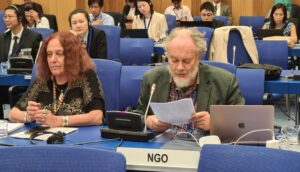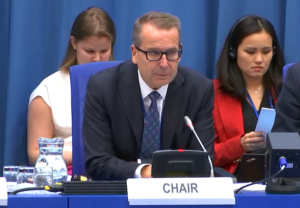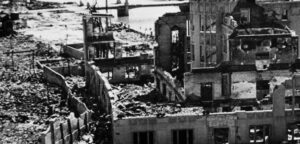by Gen. Bernard Norlain and Marc Finaud *
The official nuclear doctrine of France is meant to be clear and simple: nuclear deterrence is designed to protect France’s “vital interests”. Its latest formulation was presented by President Emmanuel Macron in February 2020 as follows:
“Should the leader of any State underestimate France’s deep-rooted attachment to its freedom and consider threatening our vital interests, whatever they may be, that leader must realize that our nuclear forces are capable of inflicting absolutely unacceptable damages upon that State’s centres of power: its political, economic and military nerve centres.”
This formulation, despite its deliberate ambiguities, particularly about the definition of “vital interests”, clearly implies that France is ready to use its nuclear weapons in case of a threat to such interests which may take the form of a conventional, chemical, biological, or cyber attack and not necessarily an attack with nuclear weapons. This statement needs to be read in conjunction with a previous declaration by President François Hollande in 2015 according to which:
“France will not use nuclear weapons against states not armed with them that are [party to] the [Non-Proliferation Treaty] (NPT) and that respect their international obligations for non-proliferation of weapons of mass destruction.”
In other words, France could use nuclear weapons against non-nuclear weapon states party to the NPT in case France decided that they were in non-compliance with the NPT, the Comprehensive Test Ban Treaty, the Biological Weapons Convention, and/or the Chemical Weapons Convention. What is unclear is whether the other condition would apply: a threat to France’s vital interests.
This ambiguity is the reason why the French government has consistently been opposed to the policy of no-first use that would restrict the possible use of nuclear weapons to response to a nuclear attack. When the French doctrine was developed in the 1960s, the purpose of the French nuclear forces was to deter a major conventional, chemical, or biological attack by the then main potential aggressor, the Soviet Union, that, along with the Warsaw Pact, did enjoy massive superiority. Maintaining such a doctrine does not make sense after the collapse of the Soviet Union, the disappearance of the Warsaw Pact, the colossal elimination of conventional weapons thanks to the CFE Treaty, the quasi-universality of the Biological and Chemical Weapons Conventions, and the current unmatched conventional superiority of NATO. Only a nuclear attack could indeed seriously threaten the country’s vital interests in destroying its population and infrastructure.
What the French supporters of nuclear deterrence fear the most from a no-first use policy is the considerable reduction of the role and value of nuclear weapons that would result from it. Indeed, if all nuclear-armed states agreed to that policy, they would have less reasons for clinging to their nuclear arsenals, let alone modernizing or expanding them for decades. This fear is obviously shared by the military-industrial complex that is thriving under a policy of first use of nuclear weapons because it realizes that a no-first use policy would not just be declaratory but would entail the elimination of those categories of nuclear weapons that lend themselves most to a first strike (intercontinental ballistic missiles, tactical or low-yield weapons, hypersonic missiles, etc.).
The proponents of nuclear deterrence now finally recognize that the risk of use of nuclear weapons has increased in recent years and they pledge to reduce such risks, as the five NPT Nuclear-Weapon States stated in their 4 January 2022 declaration. This admission and the reaffirmation that “a nuclear weapon cannot be won and must never be fought” are welcome. However, one can only wonder how those states, four of which (apart from China) still maintain the option of first nuclear strikes, expect to reduce the risk of use of nuclear weapons effectively.
As the United Nations Secretary-General recently recalled in response to the Nuclear-Weapon States’ declaration, “the only way to eliminate all nuclear risks is to eliminate all nuclear weapons.” This truth must be repeated over and over. But before we reach this goal of a nuclear-weapon free world, the urgent priority is to prevent any use of nuclear weapons. And adopting a global no-first use policy would move the world away from the brink of catastrophe.
* Gen. Bernard Norlain is the President of ‘Initiatives pour le Désarmement nucléaire’ (IDN)
Marc Finaud is Vice President of ‘Initiatives pour le Désarmement nucléaire’ (IDN)
Watch videos by Bernard Norlain and Marc Finaud
Photo/graphic by Grispb 123RF




